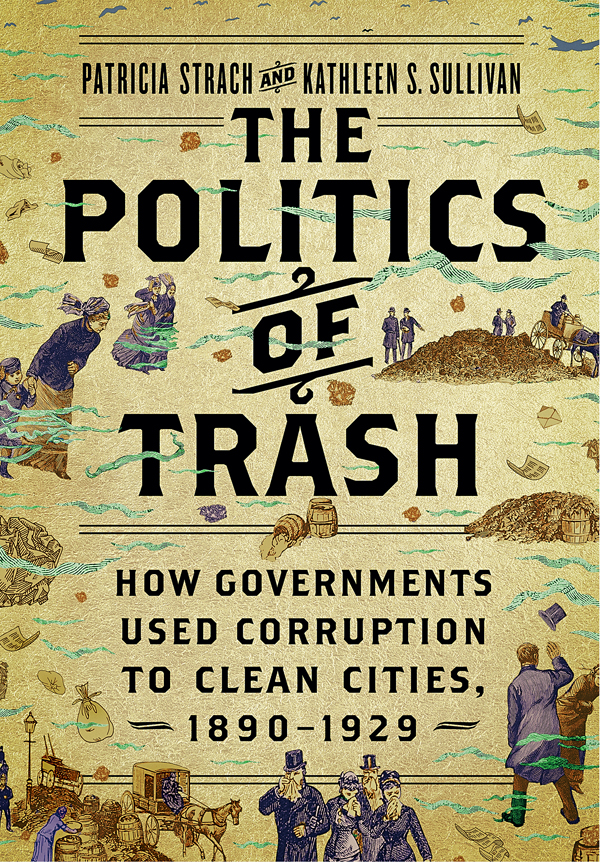
Kathleen Sullivan's new book talks trash in the Gilded Age, with politics and corruption aplenty

The late 19th century was a time of rapid growth in American cities. Political scientist Kathleen Sullivan writes in her new book that more people meant more waste, more trash, and more threats to human health.
But as the streets, sidewalks, and waterways filled with horse manure, human waste, industrial waste, and even animal carcasses, public health measures alone were not going to fix the problems. It took unexpected resources, such as political corruption, to organize trash collection.
Sullivan and her co-author Patricia Strach were surprised to find some of the dirty politics that it took to clean cities. The Politics of Trash: How Governments Used Corruption to Clean Cities, 1890–1929 (Cornell University Press, 2023) explains how municipal trash collection solved odorous urban problems using nongovernmental and often corrupt means.
Their work has been featured in New York magazine, on Jonathan Van Ness’ Getting Curious podcast, The Gilded Age and Progressive Era podcast, and at Columbus Metropolitan Library’s Local History & Genealogy Division. They are scheduled to present to the Massachusetts Historical Society and at an anti-corruption workshop at the University of Barcelona.
Sullivan is associate professor of political science in the College of Arts and Sciences at Ohio University. Strach is professor of political science and public administration and policy at the University at Albany, SUNY.
Filthy Problems
City residents were accustomed to taking care of garbage on their own. They might sell it to a farmer who would feed it to livestock. They might contract with a local scavenger to dump their trash outside of town or on an empty lot. Or they might just bury it in their back yard.
As city populations grew and became more concentrated, those individual ways of dealing with garbage were no longer going to work.
Heaps of garbage attracted vermin and could be washed into the waterways during a rainstorm. Garbage was now a public health problem, and it required a public solution.
“And if there were regulations, the Board of Health set the regulations, but they had no enforcement power. So even if people were trying to do the right thing, this was a problem you couldn’t handle individually," Sullivan explained on Van Ness' Getting Curious podcast.
Unexpected Solutions
Sullivan and Strach, political scientists who study American political development, were surprised to find that politics was embedded, and still is, in trash collection, and that public officials, revenue and public services—the conventional tools of governing—didn't necessarily provide the best solutions to the trash problem.
"We walked into the archives in Pittsburgh, New Orleans and San Francisco with presumptions about what counts as political development. We thought that a city with municipal collection had a lot more state capacity than a city that contracted out garbage collection," they wrote in a Trash Talk blog.
"We were surprised to find that our city with municipal collection (New Orleans) had trash in the streets and sent the garbage down the river in leaking scows, while the city that contracted it out (Pittsburgh) invested in the innovative infrastructure of garbage reduction. And the city that was classed as having 'no municipal collection' (San Francisco) licensed privately organized scavengers who are still in operation today. In being surprised, we rethought our own conceptual tools for identifying political development," they wrote.
The Politics of Garbage Cans
The researchers also discovered what they call "the politics of garbage cans.”
While rolling a trash can to the curb seems like an expected weekly chore to any of us today, the early days of garbage collection reveal it to be a political act.
"This book really made us think about the politics of garbage cans. When New Orleans’ garbage ordinance required that residents sort their garbage, residents bristled. They didn’t want to buy the requisite garbage can, and they were salty that the collector wouldn’t pick up shoes or bottles or tin cans. Everybody was talking about it, especially the housewives. The local newspaper published an ode to 'The Garbage Box.' Citizen resistance eventually toppled the mayoral regime," they write in Trash Talk.
"But even in cities that weren’t in crisis, the reluctance of residents to comply with the rules of putting out their garbage can, in the proper lidded receptacle, at the right time, in the proper spot vexed sanitarians. Cities could come up with newfangled mechanisms for picking up garbage, they could hire engineers and garbage collectors, but if residents didn’t put out their garbage, none of it would work. The sanitary engineer Charles Chapin called garbage cans 'one of the commonest forms of nuisance,'” they write.
To solve the garbage can problem, cities needed to change people’s habits at the curb and in their home. For that, they turned to women’s civic organizations to model proper civic behavior for other residents.
The researchers discovered that corruption and racial and gender hierarchies played a key role in the development of trash collection as they located "the presence of residents at the margins, whose experiences can be as overlooked as garbage collection itself," Sullivan said.
"When the efforts of sanitarians, engineers, and reformers failed, public officials turned to the habits and tools of corruption as well as to gender and racial hierarchies. Corruption often provided the political will for public officials to establish garbage collection programs. Effective waste collection involves translating municipal imperatives into new habits and arrangements in homes and other private spaces," explains the book's website at Cornell University Press.
The Enduring Politics of Trash
A study of garbage collection made Sullivan and Strach think a lot about garbage cans, and about the travails of the experts.
There were plenty of experts on hand to solve cities’ sanitation problems. There were sanitarians, engineers, municipal reformers, civic organizations, and civic-minded business associations, but their contributions were often underutilized by political machines that used garbage collection to aggrandize their own political power and profit.
“Their political approach to garbage collection indicates that experts can identify a public problem, but without political will, capacity, and resources, they may lack the ability to solve it,” Sullivan said, noting that in the early days of the COVID-19 pandemic, the book authors applied lessons of the early days of municipal garbage collection to current political and cultural challenges to public health in a Rockefeller Institute of Government article on What Do Local Governments Need to Address Public Health Crises?
